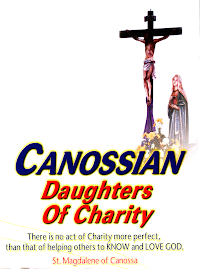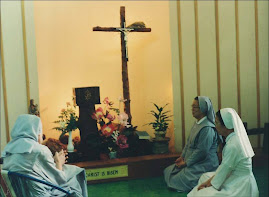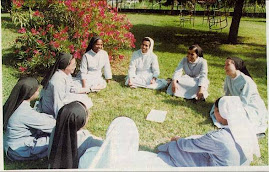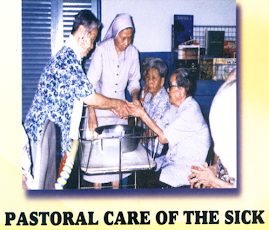
Psalm 139 v 13-14 :
truly you have formed my innermost being , you knit me in my mother’s womb.
I give you thanks that I am fearfully wonderfully made, wonderful are your works.
Inspired by these words, I would like to share a few lines on how the GOD OF SURPRISES called me to be HIS Instrument of love.
The God of the Impossible always has His Way and His Plan for each one of us. I was staying far from the Church and did not know any religious. Still, God sent numerous people to help me during the course of my searching to discover and to have the courage to respond to HIM wholeheartedly .
First ,there was a committed catechist. Be it shine or rain ,he came to our small unknown village- Bertam Ulu , faithfully to teach us ( about 15 of us teenagers ). He travelled from Air Salak on his motorcycle and prepared us for the Sacrament of Confirmation . Before the Confirmation day, he urged us to pray hard to the Holy Spirit for the gifts . Then after the Confirmation classes, he lit the spark of vocation in me by giving me the Chinese “Herald” to read. I could feel the stirring interest growing inside me and I felt this could perhaps be what I had been searching for. So , I “ shopped” around the Chinese speaking Orders to find out more. When I voiced my interest for the religious life to my mum, she was strongly against it. I knew there would be obstacles but that did not stop me from entrusting myself to the Lord. I prayed that His will be done.
Later, while I was teaching in a Kindergarten in Plentong , Johor, I met more English speaking Sisters. Aware of my inadequacy in English, I tried to avoid them and ignore the inner prompting of the Lord . But the Lord knew what was best for me and how to get me. It was through an outing with some friends in Desaru seaside that the Lord showed me who He really was. On that trip, the Lord saved me from two major accidents. He caught hold of my hand when I called out to Him just as I was about to drown. He saved me a second time on the return journey. I was supposed to be in the car that went down the cliff but because of His divine intervention, I was asked to move to another car. I was trembling with great fear after the whole event.. That evening , during Mass I simply promised the Lord not to run away from His calling anymore.
As I surrendered to Jesus, another great challenge hit me when the Apostolate Nuncio ,then in 1987, came for his Apostolate Visit to Johor Bahru and had a meeting in Plentong .Without knowing me well, he challenged me to be more proficient in English. From that time on, he constantly supported me in my vocation journey.

I was introduced to the Canossian Sisters in Singapore. My first meeting with the Canossian Sister, Sr. Christina Yeo was in his Apostolate Apartment, Singapore. Then we met in Serangoon – Joyville ,almost every weekend. As time went by, I decided to experience the different kinds of work in their ministry. So I was assigned to be an assistant nurse in St. Joseph’s Home in Jurong. Having to take care of cancer patients really broadened my perspective of life and moulded me ever deeper about the meaning of life. I had a totally different experience of the old and the sick and with those innocent small children .I was touched by the authentic pastoral witness of the Sisters. They serve others with so much patience, love, gentleness , kindness and great sacrificing spirit .

Deep down in my heart , I felt the Lord was calling me to follow Him more closely and to serve Him wholeheartedly in the Canossian Spirit . With the firm encouragement of the Apostolate Nuncio and the grace of God, I humbly responded to His call in 1994. The Lord has blessed me with a few companions on the journey in Postulancy and Noviatiate in Singapore .
I put all my trust in the Lord that He will keep his promises just like in
(insert pictures 1,2,3 at this side)
JEREMIAH 33v14- .
“ I will fulfill the promise I made to the house of Israel and Judah.”
ISAIAH 38 v-“ The Lord will do what he has promised” .
With the help of Mother Mary ,I said my first “ Yes” on 1 January 1998.
The love of God has never left me even in the most sorrowful and doubtful moments. He continues to sustain me with His graces , blessings and gives HIMSELF freely in the EUCHARIST and THE HOLY SCRIPTURES.

He invites ,challenges and demands me to give the best in the ministry ,to witness to His great love through teaching, catechizing, visiting, breaking the Bread of Life-His Holy Word. I share the deep desire of our Founder St. Magdalene who said “ Prevention is better than cure” . and so I serve the little ones by educating them, forming them and moulding their characters to be fully alive according to the famous words of John Power S.J , I feel enthusiastic about working with the youths and to help them know themselves better and to keep their priorities right. I find it a challenge to understand the culture of the youths and to accept them and to journey with them in faith.

I am looking forward to better myself by constant learning, reflecting and to be open to the guidance of the Holy Spirit so that I can serve the Lord even more generously, faithfully and joyfully.

truly you have formed my innermost being , you knit me in my mother’s womb.
I give you thanks that I am fearfully wonderfully made, wonderful are your works.
Inspired by these words, I would like to share a few lines on how the GOD OF SURPRISES called me to be HIS Instrument of love.
The God of the Impossible always has His Way and His Plan for each one of us. I was staying far from the Church and did not know any religious. Still, God sent numerous people to help me during the course of my searching to discover and to have the courage to respond to HIM wholeheartedly .
First ,there was a committed catechist. Be it shine or rain ,he came to our small unknown village- Bertam Ulu , faithfully to teach us ( about 15 of us teenagers ). He travelled from Air Salak on his motorcycle and prepared us for the Sacrament of Confirmation . Before the Confirmation day, he urged us to pray hard to the Holy Spirit for the gifts . Then after the Confirmation classes, he lit the spark of vocation in me by giving me the Chinese “Herald” to read. I could feel the stirring interest growing inside me and I felt this could perhaps be what I had been searching for. So , I “ shopped” around the Chinese speaking Orders to find out more. When I voiced my interest for the religious life to my mum, she was strongly against it. I knew there would be obstacles but that did not stop me from entrusting myself to the Lord. I prayed that His will be done.
Later, while I was teaching in a Kindergarten in Plentong , Johor, I met more English speaking Sisters. Aware of my inadequacy in English, I tried to avoid them and ignore the inner prompting of the Lord . But the Lord knew what was best for me and how to get me. It was through an outing with some friends in Desaru seaside that the Lord showed me who He really was. On that trip, the Lord saved me from two major accidents. He caught hold of my hand when I called out to Him just as I was about to drown. He saved me a second time on the return journey. I was supposed to be in the car that went down the cliff but because of His divine intervention, I was asked to move to another car. I was trembling with great fear after the whole event.. That evening , during Mass I simply promised the Lord not to run away from His calling anymore.
As I surrendered to Jesus, another great challenge hit me when the Apostolate Nuncio ,then in 1987, came for his Apostolate Visit to Johor Bahru and had a meeting in Plentong .Without knowing me well, he challenged me to be more proficient in English. From that time on, he constantly supported me in my vocation journey.

I was introduced to the Canossian Sisters in Singapore. My first meeting with the Canossian Sister, Sr. Christina Yeo was in his Apostolate Apartment, Singapore. Then we met in Serangoon – Joyville ,almost every weekend. As time went by, I decided to experience the different kinds of work in their ministry. So I was assigned to be an assistant nurse in St. Joseph’s Home in Jurong. Having to take care of cancer patients really broadened my perspective of life and moulded me ever deeper about the meaning of life. I had a totally different experience of the old and the sick and with those innocent small children .I was touched by the authentic pastoral witness of the Sisters. They serve others with so much patience, love, gentleness , kindness and great sacrificing spirit .

Deep down in my heart , I felt the Lord was calling me to follow Him more closely and to serve Him wholeheartedly in the Canossian Spirit . With the firm encouragement of the Apostolate Nuncio and the grace of God, I humbly responded to His call in 1994. The Lord has blessed me with a few companions on the journey in Postulancy and Noviatiate in Singapore .
I put all my trust in the Lord that He will keep his promises just like in
(insert pictures 1,2,3 at this side)
JEREMIAH 33v14- .
“ I will fulfill the promise I made to the house of Israel and Judah.”
ISAIAH 38 v-“ The Lord will do what he has promised” .
With the help of Mother Mary ,I said my first “ Yes” on 1 January 1998.
The love of God has never left me even in the most sorrowful and doubtful moments. He continues to sustain me with His graces , blessings and gives HIMSELF freely in the EUCHARIST and THE HOLY SCRIPTURES.

He invites ,challenges and demands me to give the best in the ministry ,to witness to His great love through teaching, catechizing, visiting, breaking the Bread of Life-His Holy Word. I share the deep desire of our Founder St. Magdalene who said “ Prevention is better than cure” . and so I serve the little ones by educating them, forming them and moulding their characters to be fully alive according to the famous words of John Power S.J , I feel enthusiastic about working with the youths and to help them know themselves better and to keep their priorities right. I find it a challenge to understand the culture of the youths and to accept them and to journey with them in faith.

I am looking forward to better myself by constant learning, reflecting and to be open to the guidance of the Holy Spirit so that I can serve the Lord even more generously, faithfully and joyfully.


Sr. Lucy Eng, FdCC
Sacred Heart Convent
Melaka











